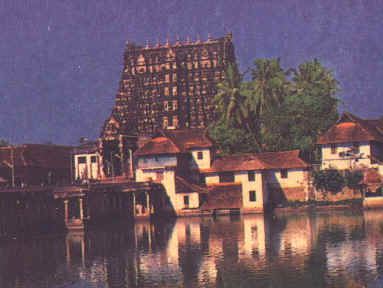The history of ancient Kerala is
closely related to that of the neighboring state of Tamilnadu. The State of Kerala was by
and large a part of the Tamil cultural domain, during the rule of the Cheras, up
to the 3rd century CE.

The earlier cave temples of Kerala
were influenced by the rock cut temple styles of the Tamil region. An indigenous temple
architecture based on the the utilitarian residential types of Kerala and the Konkan
region originated later in Kerala. Finding expression in a mixed medium of stone,
brick, laterite and wood this unique approach to temple building resulted in a
distinctive form of architecture, laying stress on sanctity, simplicity and a prevailing
naturalism which marked the worship in temples. This approach naturally leads to an
old-world charm, not seen elsewhere in the Indian subcontinent.
Bhagawati and Sastha
are the most popular of the deities enshrined in temples. So is Sankaranarayana
- the Hari-Hara manifestation of Shiva and Vishnu. Bhagawati is considered to be Narayani
- or the Vishnu-Maya. Sastha is considered to be the son of Hari
and Hara. Shiva and Vishnu are
worshipped with equal devotion in Kerala, and there are no distinctions based on the sub
religions such as Saivism and Vaishnavism as seen elsewhere. In fact, Anantasaayi, or
Vishnu enshrined in a reclining posture, is depicted with a Shiva lingam
below his extended right arm, unlike in Tamilnadu.
The Shiva Vishnu synthesis in general
modes of worship based on earlier Indian societies of the pre Christian era has been
preserved in Kerala. The temple culture of Kerala also stresses the importance of the
ancient Indian epics.
The temple culture in Kerala is based
on Vedic moorings, in contrast to the Agamic traditions
of Tamilnadu. The sustenance of ancient practices of worship, causes devotees to step into
a different world upon entering the temple precincts. For instance, the use of oil lamps
in contrast to electric lamps, lends an air of sereneity and mysticism to all Keralite
temples.
In contrast to Tamilnadu, the Keralite
temple tradition focuses only on the deity enshrined in the sanctum (moola bhera) and has
no importance laid on processional deities (utsava bhera). Most temples do not have
shrines to the consorts of the presiding deities, although the concept of Bhoga
Shakti prevails (see Tiruvarur in
Tamilnadu).
The earlier temples of Kerala were
primarily for Shiva and Vishnu or their manifestations (Krishna, Parasurama, Rama,
Vamana). Shiva is worshipped both in the iconic and the aniconic Linga form. Swayampradhana
shrines to Ganesha, Kartikeya are of later origin, and are seen more in the temples of the
peripheral regions of Kerala adjoining Tamilnadu or Karnataka.
Inscriptions in Kerala are mostly in
the ancient Vattezhuttu script of Tamilnadu. Malayalam inscriptions are
seen from the 16th century onwards. Temples have been constantly rebuilt and renovated,
unlike in Tamilnadu where more permanent structures of granite were built and engraved
upon.
The temples of Kerala are referenced
in the works of the Tamil Alwar Saints and the Nayanmar
Saints. Kulasekhara Alwar and Cheramaan Perumaal (one of
the Nayanmaars)belonged to the Cheras of the ninth century CE. There are several works on
temple architecture written in Kerala during the 15th and the 16th centuries. The Bhakti
literature of the 16th century played an important role in the temple culture of
Kerala.The Maharajas of Travancore were ardent patrons of temples.
See Also
The Alwar Divya Desams of Kerala
Tiruvanchikkulam (associated with Cheramaan
Perumaal) Kerala Temple Architecture
